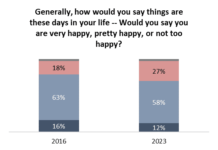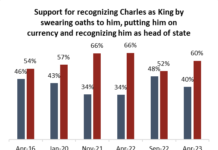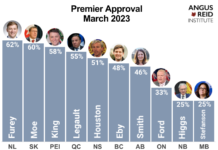THE majority of Canadians see the Muslim community in this country as a partner in the fight against radicalization, but also say Muslim community leaders need to do more to denounce acts of homegrown terror, according to a comprehensive survey on radicalization and homegrown terrorism by the Angus Reid Institute (ARI) in partnership with others.
The online poll also shows Canadian opinion fluctuates significantly on support for wearing religious symbols and clothing in public, depending on the article being worn – and the religion it is associated with.
Views about Canada’s Muslim community:
Revelations by police that suspects in the October 22 Parliament Hill shooting and the hit-and-run attack on military personnel the same week in Quebec were motivated by violent political ideology related to Islam once again bring the Canadian public discourse and views towards the Muslim community and its leadership.
To that end, ARI asked respondents how they viewed the Muslim community and its leadership in light of these acts. The majority (58%) of Canadians say the community is a “partner in the fight against radicalization”. A sizeable minority (42%), say the Muslim community as “part of the problem of radicalization.”
When results are analyzed based on whether respondents believe radicalized individuals are currently living in their communities, the minority turns into a slim majority.
For those who believe such people are living among them, just over half (53%) see the Muslim community as part of the problem. For those who say radicalized individuals are not living in their communities, the majority (66%) see the Muslim community as a partner in the collective fight.
The national majority view that the Muslim community are partners in fighting radicalization does not mitigate another widespread view: that Muslim community leaders have been too quiet in denouncing violent ideology and acts of violence. Nationally, three-quarters (73%) of respondents say, “Muslim community leaders are not speaking out enough” against homegrown terrorism. This view is strongest in Saskatchewan (76%) and Atlantic Canada (78%), and weakest in Alberta (67%) and BC (66%).
Issues of tolerance:
When asked if respondents supported or opposed people wearing various religious symbols or clothing in public, those surveyed generally approved, however, a few distinctly stand out.
In contrast to the majority of Canadians who support woman wearing the Hijab and a Nun’s Habit – 73 per cent and 88 per cent respectively – seven out of ten (73%) oppose Muslim woman wearing a Niqab in public – a veil that covers the face, showing only the eyes –. The generations are divided on the subject with 42 percent of 18 to 34 year olds supporting the Niqab while eight in ten (85%) aged 55 and older, oppose its use.
The Kippa, Star of David and Crucifix received wide spread approval (80%, 86% and 89% respectively), whereas the Kirpan – a ceremonial dagger carried by Sikhs – was deemed unfit to wear in public by 71 per cent of respondents.
Regionally, however, support and opposition became more polarized. British Columbians showed the most wide spread support, while many in Quebec deemed the religious symbols and garments unacceptable for public display.
Causes of Radicalization:
ARI asked Canadians what they thought caused people to become radicalized. They were asked to choose from a number of possible causes. Respondents picked three causes most often:
* Religion/culture (47%)
* Mental illness (37%)
* Feelings of marginalization (34%)
It is notable that gender divides perception of their top two choices. Where Canadian women were almost evenly split between religion/culture (43%) and mental illness (40%), men were much more adamant that religion/culture (51%) was a bigger cause than the state of one’s mental health (33%).
Other causes included “internet recruitment”, “old country beliefs” and “economics/financial problems.”
Respondents were also gauged on their support or opposition towards possible measures aimed at addressing the radicalization process and preventing violent acts.
One hypothetical measure commanded the most support: a federally-funded program aimed at specifically training mental health workers to identify signs of radicalization. This garnered the backing of 87% of respondents nationally, with no significant difference in regional or demographic response.
Other measures that garnered majority support included:
* Blocking access to Internet sites that promote ISIS or any other terrorist organization (83%)
* Deportation (82%)
* Indefinite imprisonment (68%)
There was one hypothetical measure on which support was much more tepid and on which Canadians were evenly divided. This was the suggestion of a federally funded grant program for mosques in Canada that wished to spend money on preventing radicalization. Half of respondents (49%) said they supported such a measure. Half (51%) said they opposed it.















